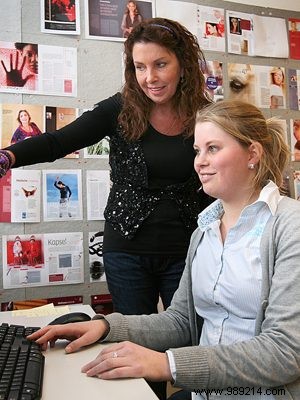
Recently, twenty-year-old Michelle Engelen, student, volunteer and chronically ill young person, spent a day on the editorial board of Santé.
Michelle: “This day fits in seamlessly with one of my dreams: set up your own magazine. A magazine for people with a chronic illness or disability, in which the subject of health is combined with fashion, beauty and sport. Not only to give 'tips and tricks', but also to create understanding among 'ordinary' people for people with a disability or condition.
I myself also belong to the group of chronically ill and with that I also fall under the Wajong Act:the Work and Employment Support Act for Young Disabled People † Someone who became incapacitated for work during his youth or study, and as a result was unable to build up an employment history, is eligible for this benefit. The people who (could) belong to this group are very diverse, from severely physically and mentally handicapped people to people with diabetes; from someone who has only completed primary school to someone who is university educated. However, a large proportion of the Wajongers are able to work (to a limited extent) and function normally in society, albeit sometimes with adjustments. However, few employers are aware of this, and some are not even aware of the concept of 'wajong'. Fortunately, the government sees that too:it wants to pay attention to disabled people in a positive way, so that they are judged more on what they can do instead of on what they can't.
I told my story to the Santé editors during the workshop day. Since birth I have suffered from chronic renal insufficiency, which means that my kidney function continued to deteriorate. At the age of fourteen, to avoid dialysis, I received a kidney from my father. Often people are impressed by the fact that I just finished high school despite everything. But my experience is that a lot of young people with disability benefits have that perseverance. They have learned to deal with adversity and to adapt to situations or limitations.
I am currently in my third year of the bachelor's degree in Public Administration and Organizational Sciences. In addition to my studies, I am active as a volunteer at the Dutch Kidney Patients Association and the Sport and Transplantation Foundation. Both organizations give me the opportunity to generate more awareness and understanding for organ donation, which will hopefully lead to more organ donors. I also actively play badminton. In short:thanks to my new kidney I lead a normal life again. The only limitation I occasionally experience is that I tire a little faster. I hope to be able to work just like everyone else after my studies, despite the fact that I am now a disabled person. And with some help and, above all, understanding from the employer, I am convinced that this should work.
I thank the Santé editors for their hospitality and the wonderful experience!”